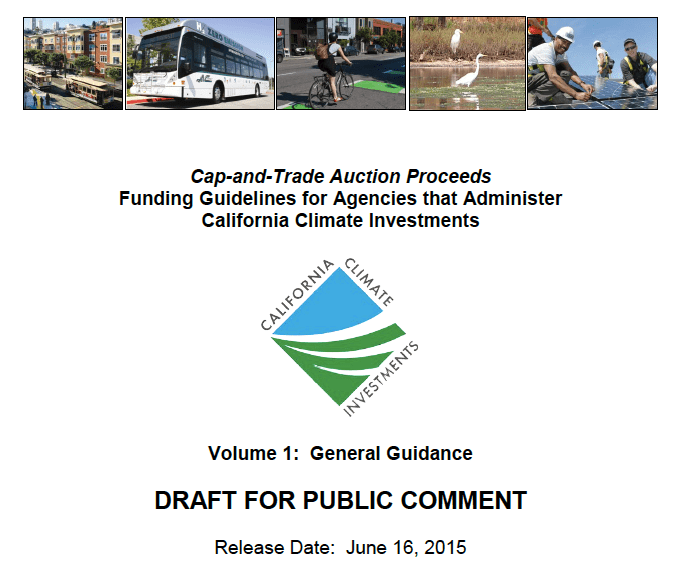
The California Air Resources Board released a draft of its guidelines for programs funded by cap-and-trade revenue [PDF], and will hold a workshop [PDF] on Monday to receive feedback on them.
Cap and trade is a state program to reduce greenhouse gas (GHG) emissions. It limits total emissions for industries, and auctions emissions credits. Auction revenue goes into the Greenhouse Gas Reduction Fund (GGRF), which goes to further reduce emissions and help California meet the goals of its Global Warming Solutions Act.
The just-released draft guidelines aim to set consistent policies for the wide variety of programs funded by the GGRF, including such diverse ones as high speed rail and the Affordable Housing and Sustainable Communities Program. They are the outcome of public workshops held in Fresno, Los Angeles, Oakland, and Sacramento last fall, as well as meetings with state agencies that administer GHG programs.
“The purpose of the guidelines is to establish expectations for all the agencies that administer these programs, and to [guide] what they should be considering when they're designing them,” said Matthew Botill of the California Air Resources Board.
Twelve agencies currently oversee over forty types of programs funded by the GGRF. Forty percent of the funds have not yet been allocated to specific programs, pending ongoing discussions between the legislature and the governor, so new programs may still be created, and more state agencies could become involved. "We want to make sure that, at the end of the day, we're providing information [about these programs] in a consistent way, to both the public and the legislature," said Botill.
The draft guidelines reflect the requirements of laws regulating cap-and-trade. These include A.B. 1532, which requires that the funds be used to reduce GHG emissions, and S.B. 535, which requires that a portion of each program benefit disadvantaged communities.
The guidelines are divided into three sections:
- General requirements, including accountability and transparency
- Maximizing benefits to disadvantaged communities
- Documenting greenhouse gas reductions and other benefits
The Monday workshop [PDF] will be an opportunity to publicly discuss the guidelines. "We are specifically looking for feedback on the level of information that we should be asking for," said Botill. The Air Resources Board seeks feedback on specific details as well as the best ways to make program reports useful and consistent.
For example, programs must discuss the GHG reductions they purport to produce. For transit projects, metrics are specified in the guidelines. Route improvements, number of trips via alternative transportation, and number of transit passes issued are some of the suggested metrics. For high speed rail, the proposed reporting requirements are currently much more vague.
Another topic the guidelines address is how to quantify GHG reductions. The methods are not included in the guidelines because they are not static; each program has developed a separate method, and has used it primarily to select projects. For reporting results, more consistency across programs will be necessary. A process for developing and improving existing methodologies is proposed on page 17 of the guidelines [PDF].
Monday's workshop will also be available via webcast.
Comments can be submitted here until June 29.





